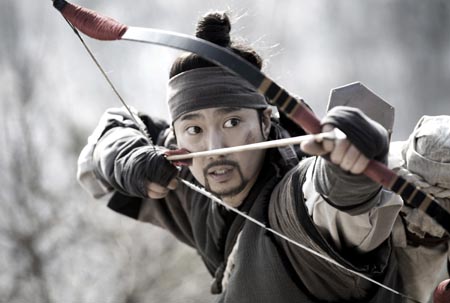The War of the Arrows

The Korean film industry has seen an
amazing resurgence in the past decade, with films such as My Sassy
Girl (2001) and The Host (2006) setting box office records in
their native land and cementing South Koreaís position as one of the
dominant cultural forces in the Pan-Asian region.
A monumental hit for previously
little-known director Kim Han-min, period epic The War of the Arrows
has continued this trend, garnering some 8 million admissions in its
homeland alone and sweeping the Korean film awards for its year.

Set in 1636 during the second Manchurian
invasion of Korea (the Japanese must have been taking a breather), the
film tells the story of one man, Nam-Yi, and his attempt to
singlehandedly rescue his kidnapped brother and his bride-to-be from
clutches of the evil Manchurians. The filmís appeal to the Korean
psyche is obvious, with the archetypal archer Nam-Yi embodying both
Korea itself and the struggle for liberation from tyranny in much the
same way that Captain America essentially becomes America when he
is doing battle with whichever US enemy is flavour of the decade, be it
Naziís, Reds or Al-Qaeda. The only question remains: can the film
appeal to Western audiences in the manner of some of its predecessors?
The answer is, well, yes. Both a potent
examination of revenge and an unashamedly lush visual spectacle, the
film manages to transcend the confines of genre convention and
brilliantly encapsulates the notion of one manís struggle representing
that of an entire nation. Kim Han-min is a consummate stylist and the
film also manages a deft and believable balance between action and
romance. The filmís denouement has been criticised in certain quarters
as being too melodramatic for Western tastes, but anyone whoís ever seen
a Hong Kong soap will find the ending positively restrained in
comparison. The pathos is rather bold (or is that bald?) certainly, but
not inappropriate given the privations suffered by the Korean people of
the age or the protagonists in the present feature. This is a supremely
strong feature from Kim, and one of the most accomplished and enjoyable
Asian epics of the past several years.
Bonus Features
A short, 4-minute selection of Behind the
Scenes clips, a 3-minute highlight reel that essentially functions as a
glorified trailer, and the actual trailers for the film. Not a great
deal on offer but itís better than the US Blu-ray edition, which
evidently contained diddly in the way of extras.